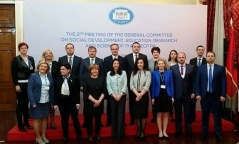National Assembly of the Republic of Serbia / Activities / Activity details

9 April 2016 Olena Papuga, member of the National Assembly’s standing delegation to SEECP PA, at the meeting of the General Committee on Social Development, Education, Research and Science
Saturday, 9 April 2016
Meeting of SEECP PA General Committee on Social Development, Education, Research and Science
Olena Papuga, member of the National Assembly’s standing delegation to the South East Europe Cooperation Process Parliamentary Assembly (SEECP PA), took part in the meeting of the General Committee on Social Development, Education, Research and Science on 8 and 9 April, in Tirana, Albania.
The participants stressed that in the previous period the region of South East Europe was frequently the focus of debates on the protection of children on the move, and the so-called Western Balkan route is the main route taken by refugees and migrants crossing the Mediterranean on the way to north Europe. They agreed that some of the SEECP member states still feel the effects of migration flows themselves, including children, but despite the different scenarios it is everybody’s duty to guarantee and respect children’s rights, including those of child migrants, as stipulated by the Convention on the Rights of the Child. The participants of the meeting stressed that child refugees and migrants have to be protected and taken care of equally, with the same rights and opportunities. In the meeting, UNICEF representatives and the countries bearing the brunt of the migrant crisis said that the majority of migrants, 41% of them, come from Syria, followed by Afghanistan (27%) and Iraq (16%). Many of these children are fleeing war and conflict, and their vulnerability is very high. UNICEF had identified five especially vulnerable groups – babies and small children, children with developmental problems and special needs, lost children, abandoned children and unaccompanied adolescents.
All the participants agreed that, though border control is very important for migration management, it should not impinge on human rights, international obligations and national legislation. National Assembly delegation member Olena Papuga informed the participants that the Republic of Serbia had adopted Instructions on the operation of social work centres and social welfare institutions in charge of housing concerning the protection and housing of unaccompanied underage migrants, and the Ministry of Labour, Employment, Veteran and Social Affairs had adopted an Action Plan for assistance, support and protection of unaccompanied underage migrants. She said that the objective of these measures was to ensure a timely, comprehensive and equal legal treatment by the social welfare centres, housing institutions whose structure incorporates special organisational units for the temporary housing and care for unaccompanied underage migrants, and other social welfare institutions. Papuga said that, in cooperation with UNICEF, the Republic of Serbia had defined risk examination procedures, contents of best interest for unaccompanied child migrants, identification operating procedure standards and implementation of social and family law protection measures, secured more field personnel for work with children, experts on call and continual training.
Papuga stressed that since the beginning of the migrant crisis Serbia has taken a pro-active approach so as to ensure adequate protection and assistance to those in trouble and showed readiness to, within its limits, face up to the rising influx of migrants. She said that Serbia is expending great efforts to offer adequate assistance to the migrants during their stay in the country, offer housing, healthcare services, food and medicines, as well as all necessary information on the asylum procedures and fully respect their human rights.
The participants of the meeting said that the member states of the South East Europe Cooperation Process keep investing into the further development of the system of protection for children so as to be able to offer adequate assistance and support to child migrants, highlighting the need for constant and transparent social debate. They said that social cohesion in one of the key common goals, adding that assistance for child migrants is part of the region’s transformation into an area of peace and stability. Therefore, they endorsed the cooperation and consultations with the International Organisation for Migrations, UNICEF, UNHCR, refugee commissariats, NGOs and humanitarian organisations of EU member states.
-
12.00 - closing ceremony of the International Girls in ICT Day (National Assembly House, 13 Nikola Pasic Square)
-
14.00 - the National Assembly Speaker meets with Baroness Catherine Ashton (National Assembly House, 13 Nikola Pasic Square)
-
15.30 - the National Assembly Speaker meets with the Ambassador of the United Arab Emirates in the Republic of Serbia (National Assembly House, 13 Nikola Pasic Square, diplomatic salon of Prince Pavle)




